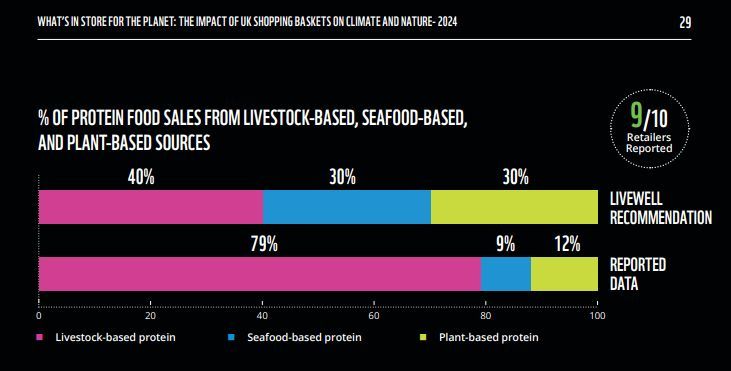Environmental charity WWF-UK has published its annual What’s in Store for the Planet report, which includes data on the lack of progress made by UK retailers towards sustainability targets.
WWF-UK has developed a healthy, sustainable diet called Livewell, which it claims could deliver a 36% reduction in greenhouse gas emissions and a 20% reduction in biodiversity loss by 2030 compared to the current average diet. Livewell has a 40:30:30 percentage split across livestock, seafood, and plant-based protein foods; it is also in line with government nutrition guidelines.
This year, the number of retailers who supplied data on the breakdown of protein food sales increased from six to nine. However, the data indicates that 79% of total protein food sales are livestock-based on average, almost double what is recommended by the Livewell diet.
The 2024 report also introduces some new measures, including the proportion of pre-prepared and composite products that are meat-based. Only two retailers were able to provide this data, but the figures show that 61% of relevant products are meat-based, compared to the Livewell target of 40%.

Another new measure analyses the breakdown of whole food sales from each of the five main Eatwell food groups (Starchy Carbohydrates, Oil & Fats, Dairy & Alternatives, Fruits & Vegetables, and Protein Foods) compared with Livewell-aligned proportions. Sales data from retailers exceeds these proportions for both Protein Foods and Dairy & Alternatives, mostly driven by livestock-based foods.
Targets for 2025
The report recommends four key actions for next year:
- Redistribution of retailers’ sales targets towards foods that support healthy, sustainable diets.
- Collaboration between retailers to create food environments (instore or online) that incentivise consumers to adopt affordable, healthy, and sustainable diets.
- Further action by retailers to publicly report on protein food type sales and set public targets aligned with WWF Basket diet metrics.
- Advocacy by retailers and other organisations for updated national dietary guidelines, along with regulations such as mandatory reporting and public targets for healthy sustainable diets. The out-of-home sector should also take responsibility for dietary shifts, along with the food industry, government, and other stakeholders.

“Much-needed reminder”
Harsh Amin, CEO of Ivy Farm Technologies, says the WWF report shows that UK retailers are not doing enough.
“The recent WWF report should serve as a much-needed reminder about how much work needs to be done for supermarkets, and the wider food industry, to reach net zero,” he told vegconomist. “While many supermarkets have targeted reduced consumption and sales of meat to tackle rising GHG emissions and biodiversity loss caused by industrial agriculture, WWF’s report shows that consumption levels are nowhere near where they need to be.
“Supermarkets need to turn their good intentions into genuine action. Educating consumers about why they need to consume less meat will be key to enacting this change, but that’s only the first step. These retailers also need to address the barriers to the adoption of more sustainable proteins such as issues with taste, convenience, awareness, and price.
“Thankfully, there are already first-mover retailers showing the way forward. Take Lidl GB for instance, which has set targets for plant-based to account for 25% of its total protein sales by 2030, while tripling its plant-based offering. Or look at Lidl Germany and other forward-thinking European retailers which are price matching plant-based products with their meat counterparts.
“By offering more choice and convenience, while matching prices, these retailers can shift consumer buying behaviours for the better. And, once cultivated meat gets the regulatory green light in the near future, the sector can play a big role in helping supermarkets and plant-based partners to address these issues even further by matching the taste of meat, like for like, but with a product which is kinder and better for our planet.”





